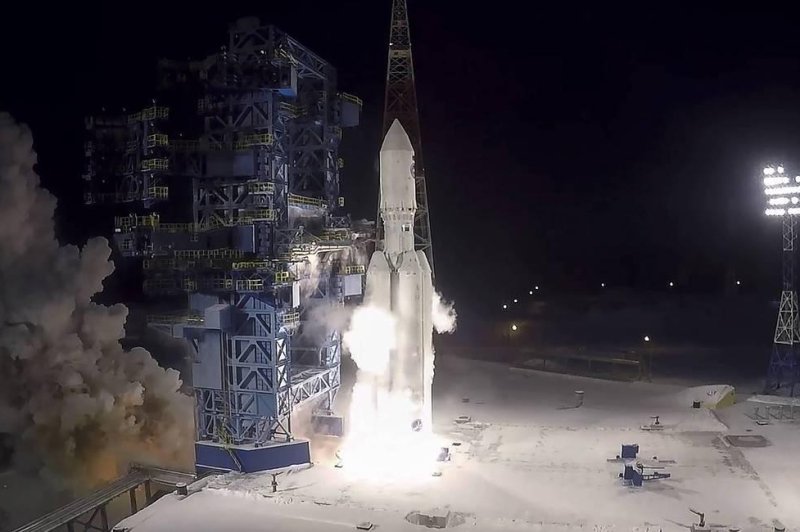SPACE JUNK
Debris from failed Russian rocket falls into sea near French PolynesiaBy Doug Cunningham

A Russian Ankara-A5 heavy-lift rocket test launches from the Plesetsk space center in northwestern Russia. Photo courtesy of Russian Defense Ministry/TASS
Jan. 6 (UPI) -- The upper stage of a failed Russian Angara A5 rocket plummeted uncontrolled to Earth, crashing into open sea near French Polynesia.
The U.S. 18th Space Control Squadron confirmed the 4 p.m. Wednesday re-entry
The Persei upper stage was part of a heavy-lift rocket. The debris weighed an estimated 3.5 tons. Astronomer Jonathon McDowell of the Harvard-Smithsonian Center for Astrophysics said most of it likely burned up in Earth's atmosphere before it hit the water.
The Russian rocket was launched Dec. 27. It was the third test flight, but that upper stage failed, causing the uncontrolled re-entry.
Space debris like this failed Russian rocket is a serious issue that has threatened the International Space Station.
In November, the astronauts aboard the ISS had to take shelter as debris from a Russian anti-satellite missile test passed closeby.
Three months ago, NASA administrators called on Congress to fund a comprehensive strategy for debris tracking and management, including international outreach.

A Russian Ankara-A5 heavy-lift rocket test launches from the Plesetsk space center in northwestern Russia. Photo courtesy of Russian Defense Ministry/TASS
Jan. 6 (UPI) -- The upper stage of a failed Russian Angara A5 rocket plummeted uncontrolled to Earth, crashing into open sea near French Polynesia.
The U.S. 18th Space Control Squadron confirmed the 4 p.m. Wednesday re-entry
The Persei upper stage was part of a heavy-lift rocket. The debris weighed an estimated 3.5 tons. Astronomer Jonathon McDowell of the Harvard-Smithsonian Center for Astrophysics said most of it likely burned up in Earth's atmosphere before it hit the water.
The Russian rocket was launched Dec. 27. It was the third test flight, but that upper stage failed, causing the uncontrolled re-entry.
Space debris like this failed Russian rocket is a serious issue that has threatened the International Space Station.
In November, the astronauts aboard the ISS had to take shelter as debris from a Russian anti-satellite missile test passed closeby.
Three months ago, NASA administrators called on Congress to fund a comprehensive strategy for debris tracking and management, including international outreach.
No comments:
Post a Comment